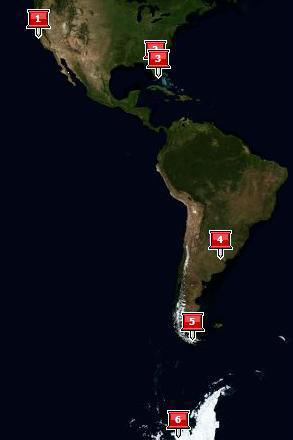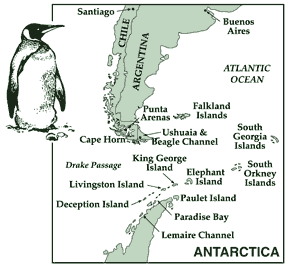Antarctic Adventure
Planning
Tuesday, November 13, 2007

It is a very long way to the South Pole.
Lawrence arrived from Australia last week, and we left for
Orlando. This is the first step in our adventure to the Antarctic! In this picture, you
can see a rough map of our trip. We headed first to Orlando for two days
at Disney World, which is a must-first stop when going to the Antarctic.
From Orlando, the next stop is Miami South Beach as we wait for our flight to
Buenos Aires in Argentina.
After an overnight stay in Buenos Aires, we pick
up our flight to Ushuaia at the southernmost tip of South America. There we
will board the M/V Ushuaia, our yacht vessel and home while we sail across the
infamous Drake Passage to the Antarctic.

Considered by scientists and travelers as one of the last
pristine regions and one of the Earth's most inhospitable habitats,
Antarctica offers the world's most magnificent wilderness with abundant
concentrations of wildlife, icebergs sculpted by the sea, and breathtaking
scenery. The Southern Ocean surrounding Antarctica provides a profusion of
wildlife that thrives on the nutrient-rich waters. Here we hope to find
blue, humpback, minke, southern right, and sei whales, along with several
species of true and fur seals, and tens of thousands of penguins of four
species known to inhabit the region. Seabirds are abundant, from albatross
to shearwaters, petrels, skuas, and gulls, all following our ship; they will
fill the sky.
See the Video Plan
Antarctica holds many answers to the world's past climate in the thousands of years of
data locked in the polar ice cap. It has been bombarded by
meteorites, some coming from the Moon and even Mars. Inside one of the
Martian meteorites, scientists have discovered evidence suggesting that life
may once have flourished on Mars. I will get to explore this controversy
during our voyage with lectures given by naturalists sailing with us. The
days will be filled with expedition landings in Zodiacs, cruising amid ice
floes and icebergs, quietly watching the antics of penguins and whales,
or bird-watching from the shore in Zodiacs or from the ship. Some days will
offer short walks that give the unique feeling of discovering the "White
Continent." There will be an extensive program of lectures and briefings on
the geology and history of Antarctic exploration, marine mammals,
ornithology, and other topics. Joining us will be scientists and naturalists
from around the world. These educators have vast experience in polar
regions and will introduce many aspects of science during lectures, field
outings, and informal discussions.
Here we go!